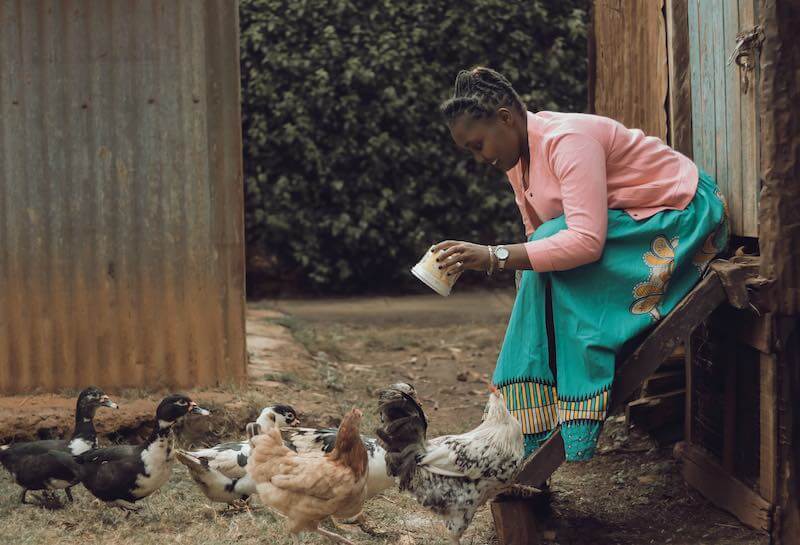There are several challenges in poultry farming business in Kenya. These range from flock management aspects to farming business management.
In a recent survey of layers poultry farmers, the following have been identified as the main challenges in the business. Disease management, feed cost and quality, unstable egg prices, low egg production rate and poultry record keeping.

In this article we will discuss the aforementioned challenges in poultry farming, with regards to the Kenyan market. However, we do acknowledge that the list could include other challenges such as flock order and purchase, and biosecurity to say the least.
We have recently been in conversations with a number of poultry farmers who have for instance incurred respective losses. For instance, some have placed chick orders but never received their orders.
You may also be interested in our comparison of improved kienyeji breeds compared.
5 Challenges in poultry farming in Kenya
Disease management
In poultry farming, disease management refers to a number of factors that can be implemented in order to reduce if not prevent disease. Such factors can include biosecurity, coop conditions, vaccine administration and so on.

Improper administration of disease management measures is likely to result to poor health, high mortality and low productivity in a flock. A lack of preparedness for disease control can result to difficult in, or ineffective disease management.
For example, one farmer has told of their loss of a 800+ birds flock from a mysterious disease. According to them, they suspected the disease to have come or spread from a neighbouring piggery farm.
Feed cost and quality
Farmers have expressed concern over the uncertainty of feed quality from different poultry feed brands. Well established brands such as Unga and Pembe are known to have high quality feeds. However, in comparison, they are deemed as expensive.
On the other hand are newer poultry feed brands. Some are offer quality feeds at competitive prices. Others, offer poultry feeds at lower prices but the quality becomes a question.
Unstable egg prices
According to some farmers, fluctuating and unpredictable egg prices result to small margins and therefore small returns.

At least 2 main have been attributed to unstable egg prices. Firstly is the number of middlemen involved in the business as well as the importation of cheaper eggs from neighbouring countries.
For layers farmers, egg sales account for a bigger portion of their poultry business. Therefore, unstable egg prices, is definitely one of the main challenges in poultry farming, and can in the long run undermine the sector.
Low egg production rate
Egg production rate is one fundamental indicator of a flock’s performance. Low egg production rate means a flock is producing well below flock supplier benchmark.

A number of factors can result to low egg production rates. Such factors include low quality and insufficient feeding, and the use of poultry system and coop conditions that negative affect flock productivity.
You can use Kukufarm poultry app to track egg production and production rate. Get Kukufarm from GooglePlay and AppStore.
Poultry record keeping
We cannot emphasise enough, the need for poultry record keeping. As a poultry farmer you are not only running a farm but also a business. Therefore, you need to keep records to track flock and poultry business performance.
Luckily for you, small to medium scale poultry farmers, you now have several apps and tools at your disposal for poultry record keeping.

We have already put together a criterial by which you can select a poultry app that would most suit you. In addition, we done already done a quick overview of poultry management app subscription prices. But even before you get to paying most poultry management apps offer free tiers which you can use to manage certain aspects of your farm and keep poultry records.
How to mitigate challenges in poultry farming
Research, consult and learn
There is no shortcut to poultry farming and running a poultry farming business. Similarly, there are no shortcuts to addressing and mitigating challenges in poultry farming for that matter.
According to Ngura, a prominent poultry farming expert and consultant, it is not enough to have financing required to set up a poultry farm. You’ve to be prepared to learn every small detail about raising chicken.
My friend, sacrifice some time and learn from an expert or a consultant. It costs you nothing to ask to visit or volunteer at someone else’s poultry farm. Learn about the different breeds of chicken and which to rear and for what purpose, learn about chicken feed types, learn about poultry management, learn about challenges involved in poultry farming, learn about the market demand and supply, learn about your nearby competitors, learn about how to mix your own feeds. Last but not least learn about record keeping and biosecurity measures.
Ngura
More advice from Ngura:
In your entire life you’ve never reared even one chicken, now you think that just because you have some money, you are ready to invest in the poultry business.You think that after reading from Mr. Google, reading exaggerated farming blogs or watching uncle Youtube you think that you are now set for large-scale poultry farming? The character development that will hit you is still doing press ups.
You think someone else will run your chicken business as you relax in the office in a swinging chair or as you sip Fanta orange or beer at home?At least first understand the workings of the business so that you know the right questions to ask as you manage it remotely.
There is no way your farm employee will ever understand your business better than you.When your employee realizes that they understand the workings of the business better than you, then why would they continue working for you? Or why wouldn’t they cheat on you?
If you can’t become an apprentice in another person’s business, then at least start small. You who has never reared one chicken, what makes you start off with 3000 chicken without employing an expert at the farm? Be patient and start with 50, 100, 200 or 500 and gradually increase the number after learning about the dynamics of the business. Don’t burn your cash.In business what we have is time, persistence and perseverance. Be patient enough to learn. Go slow but sure. Make your mistakes and learn from them.
A small investment of time to consult and learn about poultry farming can save you thousands if not millions down the line. Just as with any other business, it would be unwise to blindly invest yourself into raising chicken without having the proper knowhow and guidance.
Poultry farmers cooperative
Poultry farmers are already cognisant of the fact that forming a cooperative would help them address some challenges in poultry farming. Notably, as members of a poultry farmers cooperative, they can address the issue of unstable egg prices. A cooperative can directly negotiate stable prices with retail and wholesale egg buyers.

Moreover, a cooperative can also produce high quality poultry feeds at affordable prices to its members. This can be achieved in in at least 2 ways:
- By buying bulk poultry feeds from high quality producers in negotiated prices
- By buying poultry feed inputs in bulk and therefore at good prices, and using these to produce feeds for member farmers at favourable prices
Small to medium poultry farmers would definitely gain by being a member of a poultry farmers cooperative.
One such cooperative is the Kiambu Poultry Farmers Cooperative Society. Interestingly, there has been calls for poultry farmers to form such cooperative as far back as 2016. Notably in Nyanza, poultry farmers have founded a number of such cooperatives. In our view, poultry farmers cooperatives can help farmers overcome challenges and boost success.
High egg production rates & feed quality
There are at least 3 factors that can contribute to high egg production rates. Firstly, you must ensure acquire a poultry breed with high egg production rate. Poultry breeds and respective variants do not produce eggs at the same rate.
Secondly, you should raise your chicken in poultry systems that promote high egg rates. For instance, studies suggest that cage systems are more productive than aviary poultry systems.

Lastly but not least, feed your flocks high quality feeds and in sufficient quantity as prescribed in your poultry feeding schedule. Failure to do so, at any point in your flocks age will result to loss of productivity.
In this regard, the expression “cheap is expensive” rings true. If for whatever reason you provide cheap, low quality and or insufficient feeds, you will sooner than later incur irrecoverable losses.
Also see 10 Reasons why poultry farming fails and how to avoid them.
Disease management
Poultry vaccinations, biosecurity and coop management are key to disease management in poultry farming. Since disease management is one of the key challenges to poultry farming, overcoming it can a basis for raising a healthy and productive flock.

To begin with, follow your flocks’ vaccination schedules as advised by your poultry supplier. Moreover, implement coop biosecurity and management measures to minimise disease outbreaks. You should also have a quarantine space where you can contain diseased chicken and therefore reduce the probability of disease spread in your flock.
In addition, ensure that your poultry system, feed and water are free of chemical contaminants.

